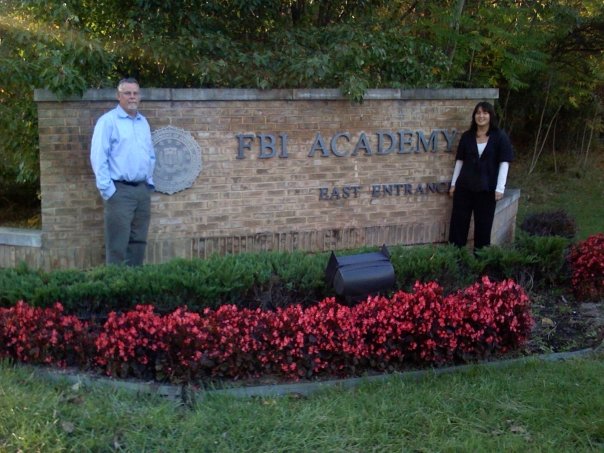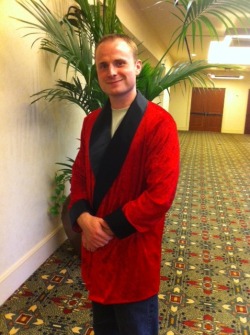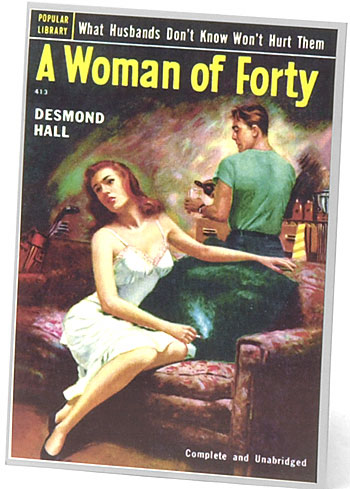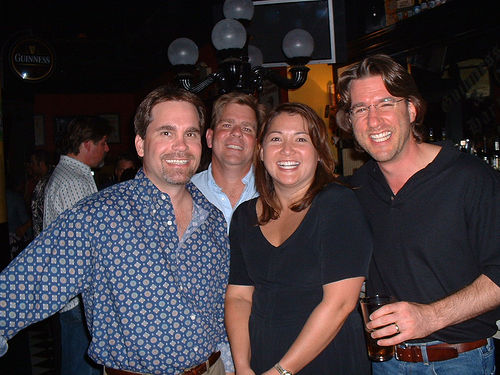
|

"The plot of an Alafair Burke thriller doesn't just rip from the headlines. She's one step ahead of them. 212 scares you and keeps you turning the pages into the wee hours."

|
Blog


Happy Halloween!Saturday, October 31, 2009
It's that time of year when I indulge my inner dork and dress the Duffer up for Halloween. This year, I let Duffer choose his own costume at the store for spoiled dogs. My husband doesn't believe me, but, I swear, this was the one Duffer sniffed most enthusiastically. Happy Halloween!
posted by Alafair Burke at 9:23 AM
1 comments


Book Reviews, Served with a Healthy Side of Snark
When writers say they don’t read book reviews, they’re usually referring to their own. Not me. Whether I should or not, I do read reviews of my own books. I don’t, however, read book reviews generally. I peruse the New York Times Sunday Book Review, as well as the book sections of the magazines to which I subscribe. I also find myself really enjoying Huffington Post's new book section. But I wouldn’t say I make a point to have my finger on the pulse of critical response. Perhaps the casualness of my book review browsing explains why I spotted a common thread among three reviews I happened to read last week. My brow first furrowed when Entertainment Weekly panned Michael Connelly’s Nine Dragons as a novel that “read like it had been scribbled during a red-eye from Los Angeles to Hong Kong.” Those were some hard words to handle, coming as they did from my pop-culture bible about my crime-writing God. Apparently also for book blogger Sarah Weinman, who tweeted, "What bug crawled up [the reviewer's] butt?" Can’t we all just get along? It turns out the reviewers were just firing up their keyboards. The following Monday came Janet Maslin’s review of Barbara Ehrenreich’s Bright-Sided: How the Relentless Promotion of Positive Thinking Has Undermined America. Maslin treats Ehrenreich’s thesis as “the makings of a tight, incisive essay,” then dismisses the admittedly “short book” as still “padded with cheap shots, easy examples, research recycled from her earlier books and caustic reportorial stalking,” with a central point “that’s as obvious on this book’s last page as it was on the first.” But Michiko Kakutani wasn’t going to let her colleague take the week’s prize for creative dissing. Her review of Jonathan Lethem’s Chronic City is so scathing I felt myself wincing with every new phrase. Just a few? “Tedious, overstuffed.” “Insipid, cartoon version.” “Sorely tries the reader’s patience.” “The characters turns out to be an annoying and tiresome lot.” And finally, “lame and unsatisfying.”
Yikes. Don’t get me wrong. This isn’t yet another writer railing against a bad review. Nor is it a claim that reviewers should only review books they enjoy. Nor is it a general indictment of the enterprise of reviewing. Nor am I claiming that the above reviewers were inaccurate. Instead, I find myself asking questions: If a reviewer concludes that a book stinks, what is the appropriate tone for the resulting review? Does the reviewer do enough by saying the book is (to their mind) bad, or does colorful condemnation help make the point? Do scathing one-liners make for more effective -- or at least more readable -- reviews, or are they just unnecessary snark? I ask because it seems to me the few bad reviews I read (hopefully not mine, fingers crossed) seem to be getting snarkier. Maybe I’m wrong about that. Like I said, I don’t scour book reviews, so my sample size is woefully unscientific. And if you listen to Brad Meltzer, stinging reviews are nothing new. But it would make sense if reviewers were getting meaner. With newspapers struggling generally, and book reviews taking a disproportionate hit, reviewers and their editors might reason that readers would rather see blood shed on the page. And if their main competitors are websites and blogs, well… let’s just say there’s no shortage of churlish comments online.
Author who read a bad review? Or reviewer who read a bad book? I’d love to hear your thoughts. Are reviews getting snarkier? Should they? And, best of all, what are some of the harshest reviews you’ve ever read (or received)? I’ll start. (1) Maybe. (2) Honestly not sure. (I know, I’m very decisive today.) (3) The Independent (UK) on my debut novel, Judgment Calls: “Does the name Burke ring any bells? Why, it's James Lee's daughter and she's written a legal thriller about as thrilling as a trip to the dentist. Dull as ditchwater, in fact. She's a former assistant DA in Portland, and if I was [sic] her, I'd have stuck to the day job. Me, I'll stick to her daddy's books.” Nice.
posted by Alafair Burke at 9:16 AM
1 comments


Turning 40 and Missing BoucherconThursday, October 15, 2009
October 16 is significant to many people, I’m sure, for a variety of reasons. Odds being what they are, someone reading this is probably having an anniversary. Or a birthday. Or a new book published. According to the handy dandy Interwebs, this Friday will mark a number of important historical events: the guillotining of Marie Antoinette in 1793, the births of Oscar Wilde and Eugene O’Neill, n 1854 and 1888, respectively, the beginning of the Cuban Missile Crisis in 1962, and the launch of Ross Perot's infomercial in 1992.
So much for a photo with both Michaels at the same time I think I just felt a tear roll down my right cheek. Why? Because I won’t be in Indianapolis. Nope, no Bouchercon for me this year. Why not? Because the second reason I’ve been eyeballing the approach of October 16, 2009, is that it marks the fortieth anniversary of my birth. I believe that makes it my fortieth birthday.
But as early 2009 whizzed by and my travel plans went left unmade, I realized I was procrastinating for a reason. I was trying to guess how I’d feel on the big day. I was imagining my own future state of mind. Stupid idea. Speculating about the future is risky. Understanding one’s current mood and its relationship to external factors is also imprecise. Throwing the two together was…well, stupid. Several months ago, past-me imagined future-me on October 16, 2009, and did not like what she saw: Me wandering around alone at Bouchercon; sitting at my signing table, saying goodbye to the last person in my modest line as the crowd waiting to see the author next to me tried to mask its pity; sobbing into my martini at the bar as I realized I was officially half way to eighty, well over a third of the way to dead. Bummer, huh? Turns out past-me sucks at both remembering the past and predicting the future. As Bouchercon approaches, I find myself recalling not those past moments of humble pie (almost) every rookie writer experiences at Bouchercon -- meandering around with a hotel map and a conference brochure as the seasoned vets exchange enthusiastic and kissy welcomes and hold court at the bar. Instead, my mind is flooded with good memories of friendships formed and a love of writing shared: the Reacher Creature parties; that amazing panel in 2006 with Ken Bruen, Laura Lippman, and fellow Ratis, Cornelia Read and Zoe Sharp; the night these guys became my pals and we smiled like people in a toothpaste ad:
Bouchercon Chicago with Ben Rehder, James Born, and Barry Eisler And, although October 16 is still a few days off, it looks like past-me also got the future wrong. I don’t feel like crap about 40 after all. I have an amazing husband and two kickass jobs. I get love from good friends and my awesome dog. I ran twenty-five miles last week, which I couldn’t do when I was 30. Or 20. And I live (and get to write about) the coolest city in the world. If I cried at the Bouchercon bar about entering a fifth decade of this life I've got, I’d deserve to get my butt kicked. Yet for reasons I had months ago, I won’t be in Indianapolis. I’ll be having a different kind of fun: that husband and a few of the good friends I mentioned will be hanging out at a beach house, frying a turkey. Today’s me predicts Friday-me will have a fabulous time. But I’ll miss you folks who are going to Bouchercon. I hope you’ll use the comments to remember the past or predict the future. What are some of your favorite Bouchercon memories or most anticipated Bouchercon events? Feel free to throw in some birthday chat as well. You never know…Friday-me might need the encouragement after all.
posted by Alafair Burke at 8:30 PM
0 comments


Sex, Lies, and Band-Aids: Why Ensign and Polanski Should Have Pulled a LettermanSaturday, October 3, 2009
Today I blog at Huffington Post about the extortion attempt against David Letterman, Letterman's decision to turn to the authorities, and potential lessons for the likes of Senator John Ensign and Roman Polanski. An excerpt: "If David Letterman had to be blackmailed over past sexual misconduct, he could not have chosen a better time. His on-air disclosure of the "terrible things" he'd done, and the subsequent threats he faced from a would-be extortionist, came four days after Roman Polanski's arrest on a three-decade-old warrant and mere hours before the front-page of the New York Times front-page story revealed additional details about the "aid" Senator John Ensign gave to his mistress's husband. Letterman reportedly makes "well over" thirty million dollars a year. Even if we round down, the blackmail demand was less than seven percent of his annual salary, the equivalent of about twenty-seven hundred dollars for a man who makes forty grand: not a bad price for silence. But Letterman, despite whatever idiotic (or worse?) things he may have done with women on his staff, was wise enough to realize that silence isn't permanent and peace of mind can't be bought." Read the complete piece here. I'm still earning Huffington Post's love, so I hope you'll take the time to click on the story, become a fan of my blogs for them, or post a comment on Huffington Post in response. If you enjoyed this post, please follow me on Facebook or Twitter.
posted by Alafair Burke at 12:37 PM
0 comments


I Don't Usually Like Mysteries But...
It’s that time of year – about six months out from the next publication date - when the conversations around Team Burke become dominated by marketing talk. Some authors thrive on marketing, speaking openly about the “brand” they are trying to create, the value they place in their “product,” the placement of their product in the “market.” I’m not one of those writers. Don’t get me wrong. I’m no precious, anti-commerce, purist hippie. I like four-star dining and fancy shoes way too much to try to pull off any kind of starving artist persona. I’m all for the selling of the books. My only complaint is that the rest of Team Burke – editor, publicist, marketing people, special online marketing people, the whole lot of them – look across the table at me as if I might be of some use. As if I might actually know how to get my books into the hands of the people who might enjoy them. As if I might know how to get those same people to then carry the book to a cash register. As if I have the remotest clue about why anyone likes what she likes, or buys what she buys. If I knew any of that, I’d be the genius who came up with this: Or perhaps this: Plenty of sales there to support a woman’s restaurant and shoe preferences, without having to type out all those pesky words. I do try, though. I make suggestions. Some of them actually go into the plan. Luckily, I enjoy some of the biggest parts of the plan – the touring, the facebooking, the blogging. In my academic life, I’m lucky if ten other academics read my writing, so talking with people who read my books is heaven as far as I’m concerned. But, this time around, Team Burke has added a new layer to the usual plan: “We want to get 212 to people who don’t usually read crime fiction.” Say what? "So many people here love your books even though they don’t usually like mysteries or thrillers." Read that previous sentence again. There are so many things wrong with that sentence, I don’t know where to start. Okay, I’ll start here. 1. Who the heck doesn’t like mysteries and thrillers? Given that you’re reading this particular website, my guess is you’re not one of these people. Well, whoever they are, I don’t know whether to loathe or pity them. I guess it depends on whether they think they’re too good for the genre or just don’t know what they’re missing. There’s no question, though, that these people exist. My pilates trainer just told me that she loved The Girl with the Dragon Tattoo, even though she didn’t “usually like mysteries.”
I’m sorry. I don’t understand. Which brings me to… 2. WHY would anyone not like mysteries and thrillers? To get some insight into this phenomenon, I did what anyone seeking to conduct serious empirical research would do: I Googled. An initial observation: The quantitative data support the claim that there are actually people who claim they don’t like crime fiction, as evidenced by the number of results for the following searches: 23,100 "don't like thrillers" On the qualitative side, I did find some explanations for these dislikes in my casual perusal of the search results (okay, not very scientific – whatevs): Too much violence and death The second one? I won’t even pretend to understand.
And the rest? They strike me as complaints that there’s too many bad books in the genre. But there are bad books in all genres. There are bad books pawned off as so-called “literary” fiction. There are bad books. Don’t read them. Read good ones instead. Back to the Google data: And almost always, these phrases are followed by the word “but:” “but this one kept me on the edge of my seat.” I’m sorry, but if you want your books to put you on the edge of your seat, we're your people. “but this book was so warped, convoluted, I just couldn't help but be entranced.” Um…warped and convoluted? We are totally your people. (P.S. Kudos, Christopher Rice. That’s a review to be proud of!) Here are some more typical buts (shame on you if you just snickered): but this one was very entertaining, but this book is awesome, but this one is killer, but I absolutely love this one. Do you see a trend? Basically, people don’t usually like crime fiction, but then sometimes they suddenly like crime fiction. And if you think all these “buts” are for Michael Chabon and Stieg Larsson, you’ve got another thing coming. People who think they don’t like crime fiction like Jonathon Kellerman, Michael Connelly, Alexander McCall Smith, and James Patterson. That’s some pretty genre-y genre fiction (and I mean that in the very best way as a person who loves the genre). 4. And, on the more personal side, why does a person who doesn’t usually like mysteries or thrillers like my books? As I understand it, my new fans at the publishing house are young people living their lives in Manhattan, just like the characters in my Ellie Hatcher series. The books reflect their reality. The characters sound like them, watch the same TV shows, and share the same worries. That’s all well and good, but these new readers of mine got the book for free from their employer. If they saw it on the mystery table at Barnes & Noble, would they even pick it up, let alone buy it? 5. Now, here’s the question for group discussion: How do you get a person who thinks he or she “doesn’t like” mysteries and thrillers to give a book a try? Must it be a personal recommendation from a friend: “Trust me, it’s good”? Does it have to be the water-cooler book of the season? Must it appeal to some other interest? Why does the non-genre reader read a book in the genre?If you enjoyed this post, please follow me on Facebook or Twitter.
posted by Alafair Burke at 12:31 PM
0 comments
Previous Posts
Archives
|










 But I have my eye on October 16 for two reasons. First, it’s the Friday of Bouchercon weekend, the annual mystery conference that draws writers, editors, readers, and other mystery fans from around the country. There’s no shortage of terrific programming for the weekend, and Friday is chock full of
But I have my eye on October 16 for two reasons. First, it’s the Friday of Bouchercon weekend, the annual mystery conference that draws writers, editors, readers, and other mystery fans from around the country. There’s no shortage of terrific programming for the weekend, and Friday is chock full of 





